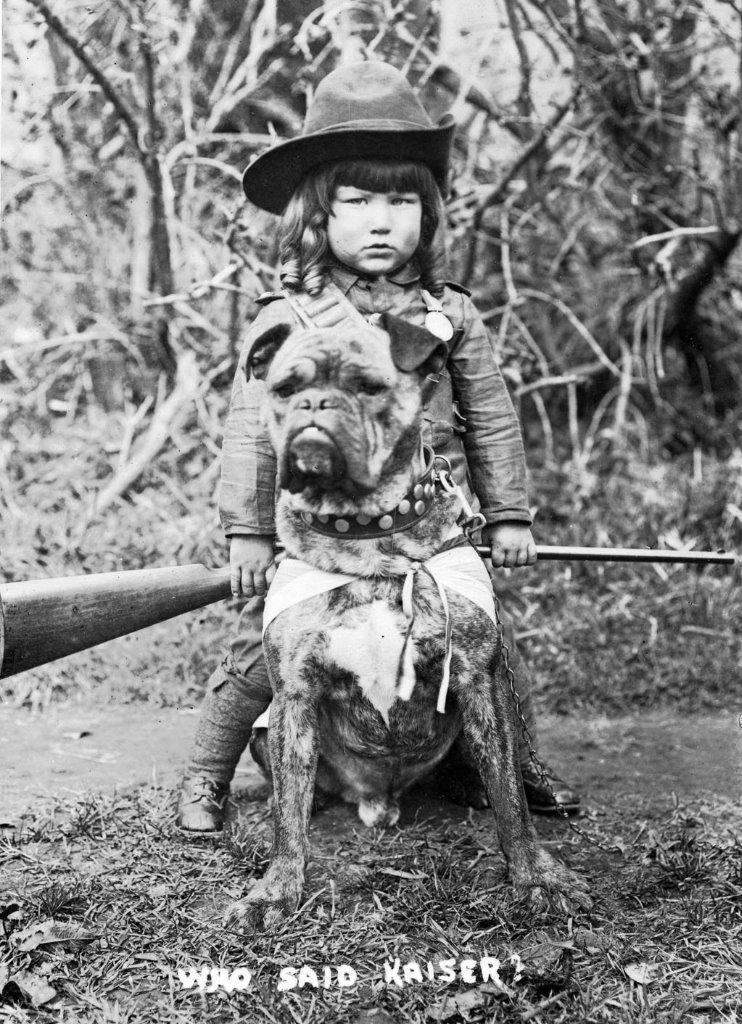
World War I: New Zealand

Figure 1.--New Zealand as part of the British declaration of war on Germany entered the war automatically. Little thought was given to the contitunionlity of this as the country was a dominion and not a colony. There was was a tremendous burst of patriotism and support for Britain. This post card is an example. Few New Zealanders understood what they were getting into. Some 100,000 New Zelanders were deployed overseas and over half were killed or wounded. There was a widespread negative reaction after the war. Some historins believe that this was essentially the birth of New Zealand as an independent country.
|
|
New Zealand found itself at war when the British declared war on Germany (August 1914). It all happened automatically without an real consideration of constitutional issues. NewZealand at the time of the war was a very small country of only 1.1 million people. By itself, New Zealand could not make a major contribution, but the Dominions together along with the rest of the Empire did make a substantial contribution. There was a strong feeling at the time that they were overseas Englismen. A separate New Zealand national identity was not yt strongly felt. The term 'Home Country' was widely used. New Zealanders did not begin to think about this until after the War. Many volunteered to support the British. More than 100,000 New Zealanders went overseas, an amazing 10 percent f the country's small population. Over half were killed or wounded--a very high rate, For most New Zealanders, it was the first time they went abroad. Ordinary people at the time did not travel overseas. That was something for the wealthy. For most of the Kiwis, it was the first time they traveled away from home. Many at first saw it as a great adventure. Virtutally no one understood what war was. The reality of war was very different. Seeing other coutries and other people for the first time, New Zealanders began to become aware of of their own individual identity. And in combat they began to compare themselves with the Germans and their Allies--especially the British. In battle, they were able to compare themselves with men from other nations. This seems to have been the turning point in New Zealand's emergence as an independent nation. Out of this, many have argued, came a sense of a separate identity, The term 'Kiwi' was populrized during the War when New Zealand soldiers began to call themselves ‘Kiwis’. New Zealand first action was to occupy German Samoa (subsequently Western Samoa) (August 30, 1914). The Australian and New Zealand Army Corps (ANZACs) landed at Anzac Cove on the Gallipoli Peninsula in an effort to open a supply route to the Russians (April 1915). It was a plan conceived by Churchill and if it had worked would have had a huge impact on the War. Several months of hard fighting, however, failed to dislodge the Ottomans and the ANZACs with drew after taking heavy casualties (December 1915). Battlefield casualties required more and more men to be fed into the caulderon of the War. The Goverment instituted conscription which became a controversial political issue. World War I was the first major military operation which both Australia and New Zealand fought, often considered their "baptism of fire" as new states. One New Zeland hitorian who fought in Gallipoli and the Western Front writes, ‘somewhere between the landing at Anzac and the end of the battle of the Somme, New Zealand very definitely became a nation’. [Burton, p. 138.] As in Europe and America, there was a tremendous popular revulsion after the war, primarily if the horific casualties. Little thought was given to what would have resulted had the Germans not been stopped.
ANZAC Day is the most important national holiday in both Australia and New Zealand.
Sources
Burton, Ormond. "A rich old man' (unpublished autobiography).
CIH -- WW I

Navigate CIH World War I Section:
[Return to Main World War I country page]
[Return to Main World War I conduct page]
[Return to Main New Zealand history page]
[Return to Main New Zealand page]
[About Us]
[Aftermath]
[Alliances]
[Animals]
[Armistace]
[Biographies]
[Causes]
[Campaigns]
[Casualties]
[Children]
[Countries]
[Declaration of war]
[Deciding factors]
-------[Diplomacy]
[Economics]
-------[Geo-political crisis]
[Home front]
[Intelligence]
[Military forces]
[Neutrality]
[Pacifism]
[People]
[Peace treaties]
[Propaganda]
[POWs]
[Russian Revolution]
[Terrorism]
[Trench warfare]
------[Technology]
[Weaponry]
[Bibliographies]
[Contributions]
[FAQs]
[Images]
[Links]
[Registration]
[Tools]
[Return to Main World War I page]
[Return to Main war essay page]
[Return to CIH Home page]
Created: 12:15 PM 1/12/2016
Last updated: 12:16 PM 1/12/2016



